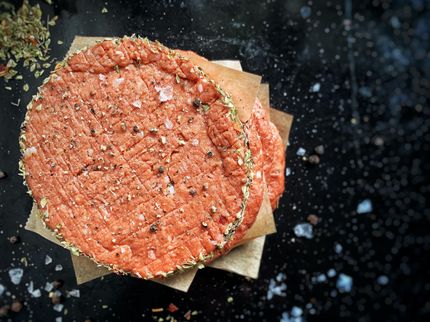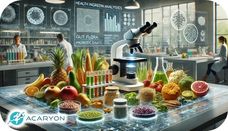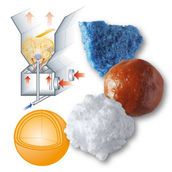Impossible Foods Is Doubling Its R&D Team and Seeking World's Best Scientists To Help Eliminate Animal Agriculture
The leading “planetary technology company” will further expand its multifaceted technology platform and accelerate next-generation product development
Impossible Foods is expanding its multifaceted technology platform, accelerating product development and plans to double the size of its research and development team over the next 12 months.

Impossible Foods
Already considered the world’s No. 1 environmental startup, Impossible Foods’ mission is to reverse global warming and halt the world’s catastrophic biodiversity collapse by creating a mainstream, mass-market, consumer movement to eliminate the most destructive technology in human history: animal agriculture. The company’s flagship Impossible Burger has already started to displace sales of animal-derived foods, whose production is one of the biggest generators of greenhouse gas emissions and the leading driver of the global meltdown in wildlife.
In addition to doubling the size of the Silicon Valley-based R&D team over the next year, Impossible Foods is launching the “Impossible Investigator” project, a unique program to woo the world’s best scientists to work on the most important scientific problem Earth has ever faced.
Impossible Investigator positions are high-impact alternatives to traditional academic faculty positions; the roles present an unprecedented opportunity for scientists who want the facilities, resources and innovative environment to create an entirely new technology platform to replace animals as our technology for turning plants into meat, fish and dairy foods.
In addition to the inaugural class of 10 Impossible Investigators, Impossible Foods also has about 50 immediate openings for scientists, engineers and other R&D professionals to join existing projects; more will be posted throughout the end of the year and beyond. Impossible Investigators and the more structured roles will more than double the size of Impossible Foods’ R&D team over the next 12 months.
For details, check out Impossible Foods’ all-new R&D recruiting site, allsciencenobull.com.
“World’s most destructive technology”: using animals to transform plants into meat.
Named Inc. Magazine’s company of the year and one of Time Magazine’s 50 Genius companies, Impossible Foods has raised approximately $1.5 billion since its founding in 2011, including $700 million in two rounds this year, which it will use to fund the expansion of its technology platform and R&D team. Over the next six to 12 months, R&D will receive the largest percent increase in investment of any area in the company.
“Scientists want to solve the world’s biggest challenges. And the greatest problem we face today is our reliance on animal agriculture -- the most destructive technology on Earth,” said Impossible Foods’ CEO and Founder Dr. Patrick O. Brown, M.D., Ph.D. “The Impossible Investigator program is an opportunity for scientists and engineers in or on the threshold of an academic career to choose another path with the biggest positive impact on humanity and our planet: using science to eliminate the most urgent existential threat we face.”
Brown, Professor Emeritus of Biochemistry at Stanford University and a former Howard Hughes Medical Institute investigator, left his job leading an award-winning Stanford biochemistry lab to start Impossible Foods in 2011.
“I know the appeal of having the freedom and the resources to tackle great problems of your own choosing in whatever way you think best,” Brown said. “We intend to make Impossible Foods the premier ‘planetary technology company’ -- the place for brilliant scientists to have that freedom to conduct the most cutting-edge experiments and bring to life world-changing inventions, with the potential to immediately scale their real-world impact and without the hassles and distractions of academia.”
All Science, No Bull
The “Impossible Investigator” program asks scientists at all career stages to envision an all-new research program within the broad scope of Impossible Foods’ mission. They can propose anything from short-term strategies to accelerate the optimization of plant-based milk or steak or fish, to longer-term ideas for a vastly improved supply chain of plant proteins and other ingredients, including novel crops and agricultural practices. Applicants will be evaluated based on the scientific merit and mission impact of their ideas as well as their potential to execute on their plans.
Impossible Investigators may have backgrounds in the life sciences, physical sciences or diverse engineering disciplines -- or they may be data analysts, neurobiologists or experimental psychologists who can advance our understanding of the sensory perception and hedonic and behavioral responses to food.
Scientists in the company’s R&D center, whose operations combine the best features of academic and industry labs, bring together ideas and technology from diverse areas of modern science to make fundamental discoveries and invent new ways to replace every major category of animal-derived food products with plant-based alternatives that are better for people and the planet, including dairy, seafood, chicken, steak and more.
Impossible scientists’ best known achievement to date, the revolutionary Impossible Burger, tastes like beef and is hailed as a triumph of food engineering -- the result of nearly a decade of basic science and hard-core research and development in the company’s headquarters in California’s Silicon Valley. These Texas ranchers can’t tell the difference between Impossible Burger and ground beef from cows, while this beef-loving food critic preferred Impossible Burger to cow-based meat preferred Impossible to cow-based meat in dozens of recipes tested; a beef lobbyist called it the “real deal” and a “wake-up call” for the livestock sector.
Earlier this year, the company also launched Impossible™ Sausage Made From Plants. That product is now available at thousands of restaurants -- from America’s most beloved diners to the most ubiquitous restaurants, as well as 200 locations in Hong Kong, making it one of the most successful growth stories of 2020.
Impossible Innovation
Impossible Foods makes meat from plants -- with a much smaller environmental footprint than meat from animals. The company uses modern science and technology to create wholesome and nutritious food and feed a growing population sustainably.
Impossible Foods is one of America’s fastest-growing brands and the leading driver of growth in the plant-based food category. Nine out of 10 people who buy Impossible Burger regularly eat animal-derived foods. According to data from consumer insights company Numerator, the vast majority of Impossible Burger sales come at the expense of animal-derived meat.
Impossible Foods has an unrivaled intellectual property portfolio with more than 250 patents and patents pending. Its intellectual property includes methods to decode and reverse-engineer the molecular foundations and entire sensory experience of animal-derived meat, including how it tastes, cooks, sizzles and smells -- and how to recreate the experience without animals.
Earlier this year, Impossible Foods created an all-new Biomanufacturing team, which scales up scientists’ core discoveries to achieve commercialization. Led by Impossible Foods’ Vice President Smita Shankar, the Biomanufacturing group takes Impossible Foods’ “basic science” innovations in genetics, fermentation and industrial engineering (among other disciplines) and generates economies of scale for mainstream, mass-market product manufacturing.
The Magic Ingredient
One of Impossible Foods’ earliest and most important discoveries was that a single molecule -- heme -- is primarily responsible for the explosion of flavors and overall sensory experience of eating animals. It is the abundance of heme that makes meat (both meat from animal carcasses and Impossible Foods’ meat from plants) uniquely delicious and craveable.
Heme is an essential molecular building block of life, one of nature’s most ubiquitous molecules. It is most familiar as the molecule that carries oxygen in your blood. In addition to animal muscle, heme is found in virtually all the food we eat. It is not only safe to eat -- it’s required for life.
To satisfy the global demand for meat at a fraction of the environmental impact, Impossible Foods developed a sustainable, scalable and affordable way to make heme and therefore meat, without the catastrophic environmental impact of livestock. The company bio-engineers and ferments yeast to produce a heme protein naturally found in plants, called soy leghemoglobin.
The heme in the Impossible Burger is identical to the essential heme humans have been consuming for hundreds of thousands of years in meat — and while the Impossible Burger delivers all the craveable depth of beef, it uses far fewer resources.
Producing the Impossible Burger uses about 87% less water, generates about 89% less greenhouse gases and requires around 96% less land than conventional ground beef from cows. For its efforts toward making the global food system sustainable, Impossible Foods won the 2019 United Nations Global Climate Action Award.
Other news from the department business & finance
These products might interest you
Most read news
More news from our other portals
Something is happening in the food & beverage industry ...
This is what true pioneering spirit looks like: Plenty of innovative start-ups are bringing fresh ideas, lifeblood and entrepreneurial spirit to change tomorrow's world for the better. Immerse yourself in the world of these young companies and take the opportunity to get in touch with the founders.
































































